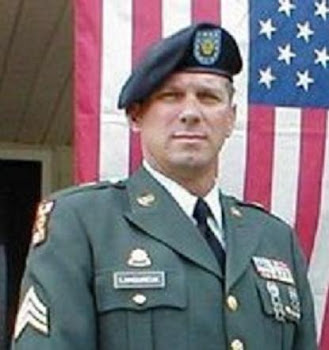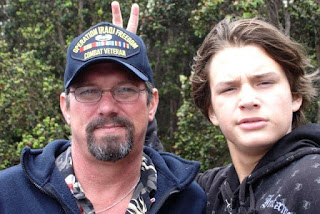(Previously posted December 16, 2009)
Tuesday, December 15, 2009
By Michelle Williams
The National Journal - Insider Interviews
http://nationaljournal.com/
(article below copied in its entirety from va watchdog dot org)
Two months ago, in a case believed to be the first of its kind, Iraq War veteran Jessie Bratcher was found guilty of murder but legally insane because of combat post-traumatic stress disorder. About two weeks ago, the Supreme Court overturned the death sentence for a Korean War veteran convicted of murder, ruling that the jury should have taken George Porter's combat PTSD into consideration.
These rulings have left observers wondering how many more cases like these will occur and what their effect will be on veterans' rights in the courtroom.
NationalJournal.com spoke with Floyd Meshad, president and founder of the National Veterans Foundation, about PTSD and capital crimes. The former Army captain counseled U.S. soldiers in Vietnam; he has been working as a therapist for veterans for more than 30 years and is recognized as one of the first to study PTSD. Because of his expertise, he was consulted in the Bratcher case. Meshad is currently working on a book to educate defense attorneys on how to handle cases involving PTSD.
NJ: The Bratcher and Porter cases showed how PTSD from a veteran's war experience can be a mitigating factor in criminal cases. How do you think these rulings will affect future cases?
Meshad: Well, it's a step in the right direction.... It's another step that enables us to present the case as PTSD. It's an acknowledgment from the top, which always helps.
It doesn't mean that it's going to be any easier because, first of all, you have to sell the court on PTSD. I've been there so many times, and they say, "Well, of course, you're a PTSD expert, and you're biased, and so everybody has PTSD," which is not the case. But you know, when you go up against prosecutors or whatever, all they're concerned about is winning. They don't care about whether it's a veteran, or Mother Theresa, or you.... It's not a profound thing. It's an important step, but it's not like it's going to change our battles in court. And obviously prosecutors won't like it because you refer to the Supreme Court and they're acknowledging it. It's still one case at a time.... [In the Bratcher case] we got the ruling, and it did set a precedent. So it's going to make it a little easier to fight for these cases, but they have to be pretty clear-cut.
NJ: There are prosecutors who are concerned that the PTSD defense may be the "go-to" to explain criminal behavior. For example, Wade Sanders, a former Navy official, said earlier this year that his PTSD led to his compulsive behavior with child pornography.
Meshad: Yeah, you'll see cases that are far-reaching. If you know any prosecutors, you'll know they're strictly linebackers. I mean they want to knock you down. It's all about winning. They don't like anything that puts them at a disadvantage to argue against.... You know, some cases are weak, and if they're weak they're not going to hold up. Their fear is there are probably a lot more defenses where they're going to misinterpret PTSD and use it as if it's a typical stress day at the office.... They fight hard to dispel it, and we fight hard if we believe in the case.
NJ: So do you think there is room for abuse of the PTSD defense?
Meshad: In a big case, no, it's not going to help.... In all, there's definitely guidelines of what PTSD is. In our cases we go through their military training and history when we present it in courts and talk about certain dates of trauma that we believe instigated what we know as symptoms of PTSD or whatever.
NJ: There are some who feel that PTSD should not be a reason to offer leniency. What are your thoughts about that?
Meshad: I feel like if you're going to send men and women off to war to do the most unnatural thing -- man's inhumanity to man -- go and kill other humans regardless of culture or religion or whatever, then you have the responsibility to bring them back and deprogram them, and they don't. That's why these things happen. So there has to be some justice. To me, it's not like they were sent off to go be an engineer in some other country and make six figures. They're in there putting their lives on the line and they go through training to numb themselves and make them killing machines.... There's many of us that feel it's the responsibility of the government to treat this guy. He wasn't treated when he came back, so he acted out. His behavior was however extreme, anti-social, but what do you expect?
NJ: So who decides that someone has PTSD?
Meshad: People like me make an evaluation. It's like you go in for cancer screening. You have a PTSD expert that assesses it. You could go to three different doctors and one can say "well, that's not cancer," or "this is." But you try to get the best.... You still have to sell it to a jury or to a judge depending on what aspect of the trial you're in, or if it's just the penalty phase where you go in and argue treatment rather than jail time.... Unfortunately in mental health, which always has been the case, even before PTSD was in diagnosis, it's professional opinions. And then the lawyers go at it from there.
NJ: Another concern some have had with the verdicts of these PTSD cases is how the condition is linked to insanity. For instance, the jury found Bratcher guilty but insane. Is it fair to link the two terms?
Meshad: It's just terminology. Different states and courts. You can be ruled insane at the time and insanity could be caused by an acute attack of PTSD or whatever. We've had tragic incidences where the wife playfully jumps on the husband in bed, and he has his weapon under his pillow, and immediately -- within a split second -- he has the pistol and blows her away. I mean, bam. It's just a reaction. You know in combat you're always with your weapon. If anybody jumps you, it's that. These reactions occur. It's unfortunate. That looks insane. I mean, why would you shoot your wife in bed? But when you play out what happened, why was there such a dramatic reaction?
NJ: But the concern is how it might put a negative label on veterans with PTSD.
Meshad: Once again, it's terminology. We don't call people with PTSD insane, [or] psychotic. They're not psychotic. It's a disorder. So I understand that. The main thing is that we won the case for the individual.... It's not really insanity as we know it. But that's how the courts -- it comes under that category. Bratcher had PTSD. They awarded it. It was argued. It was won. So they sent him to the state for a 90-day evaluation, and under their laws, it's insanity.... I don't particularly like it. But once again, the main thing is the welfare of the individual and him getting justice in the sense of treatment rather than punishment for something that we believe occurred due to his serving his country and what it's done to him.
NJ: How do you think the administration has been doing in improving the mental health care of veterans? I know that VA Secretary Eric Shinseki said improving mental health care was a priority. The president's fiscal 2010 budget will also address the issue.
Meshad: They put a great officer, a great man, a great warrior on top of an antiquated system. It would be like me putting you in a Model T Ford and asking you to go race at the race track. It's brand new and got good gas in it, and I don't care how nice that Model T is -- our cheapest car is going to blow you away.... Do you have medical insurance? Are you able to call your doctor and get in if you feel something seriously wrong? What if they handed you paperwork and told you to come back in nine months? You got to walk a mile in these guys' and gals' shoes....
We got to stop sending people to war if we're not going to help take care of them when they come back. And I mean with a first-class system. And that's it. My 40 years in this business -- it's the same ol' same ol'. It just gets bigger, and now with these two wars and recycling the men and women, it's going to be the worst ever in our history.




No comments:
Post a Comment